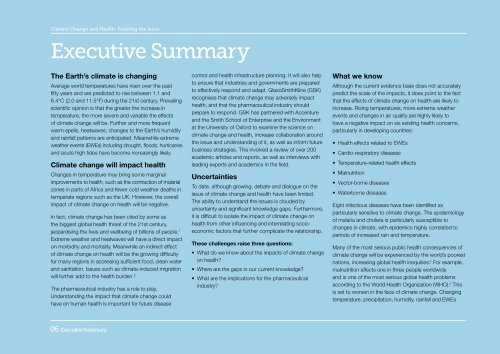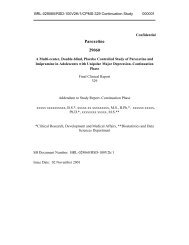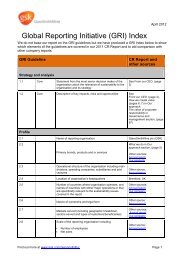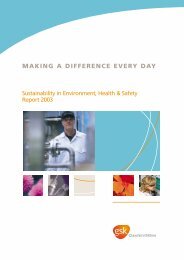Climate Change and Health: Framing the issue
Climate Change and Health: Framing the issue
Climate Change and Health: Framing the issue
You also want an ePaper? Increase the reach of your titles
YUMPU automatically turns print PDFs into web optimized ePapers that Google loves.
<strong>Climate</strong> <strong>Change</strong> <strong>and</strong> <strong>Health</strong>: <strong>Framing</strong> <strong>the</strong> Issue<br />
Executive Summary<br />
The Earth’s climate is changing<br />
Average world temperatures have risen over <strong>the</strong> past<br />
fifty years <strong>and</strong> are predicted to rise between 1.1 <strong>and</strong><br />
6.4°C (2.0 <strong>and</strong> 11.5°F) during <strong>the</strong> 21st century. Prevailing<br />
scientific opinion is that <strong>the</strong> greater <strong>the</strong> increase in<br />
temperature, <strong>the</strong> more severe <strong>and</strong> variable <strong>the</strong> effects<br />
of climate change will be. Fur<strong>the</strong>r <strong>and</strong> more frequent<br />
warm spells, heatwaves, changes to <strong>the</strong> Earth’s humidity<br />
<strong>and</strong> rainfall patterns are anticipated. Meanwhile extreme<br />
wea<strong>the</strong>r events (EWEs) including drought, floods, hurricanes<br />
<strong>and</strong> acute high tides have become increasingly likely.<br />
<strong>Climate</strong> change will impact health<br />
<strong>Change</strong>s in temperature may bring some marginal<br />
improvements to health, such as <strong>the</strong> contraction of malarial<br />
zones in parts of Africa <strong>and</strong> fewer cold wea<strong>the</strong>r deaths in<br />
temperate regions such as <strong>the</strong> UK. However, <strong>the</strong> overall<br />
impact of climate change on health will be negative.<br />
In fact, climate change has been cited by some as<br />
<strong>the</strong> biggest global health threat of <strong>the</strong> 21st century,<br />
jeopardising <strong>the</strong> lives <strong>and</strong> wellbeing of billions of people. 1<br />
Extreme wea<strong>the</strong>r <strong>and</strong> heatwaves will have a direct impact<br />
on morbidity <strong>and</strong> mortality. Meanwhile an indirect effect<br />
of climate change on health will be <strong>the</strong> growing difficulty<br />
for many regions in accessing sufficient food, clean water<br />
<strong>and</strong> sanitation. Issues such as climate-induced migration<br />
will fur<strong>the</strong>r add to <strong>the</strong> health burden. 2<br />
The pharmaceutical industry has a role to play.<br />
Underst<strong>and</strong>ing <strong>the</strong> impact that climate change could<br />
have on human health is important for future disease<br />
06 Executive Summary<br />
control <strong>and</strong> health infrastructure planning. It will also help<br />
to ensure that industries <strong>and</strong> governments are prepared<br />
to effectively respond <strong>and</strong> adapt. GlaxoSmithKline (GSK)<br />
recognises that climate change may adversely impact<br />
health, <strong>and</strong> that <strong>the</strong> pharmaceutical industry should<br />
prepare to respond. GSK has partnered with Accenture<br />
<strong>and</strong> <strong>the</strong> Smith School of Enterprise <strong>and</strong> <strong>the</strong> Environment<br />
at <strong>the</strong> University of Oxford to examine <strong>the</strong> science on<br />
climate change <strong>and</strong> health, increase collaboration around<br />
<strong>the</strong> <strong>issue</strong> <strong>and</strong> underst<strong>and</strong>ing of it, as well as inform future<br />
business strategies. This involved a review of over 200<br />
academic articles <strong>and</strong> reports, as well as interviews with<br />
leading experts <strong>and</strong> academics in <strong>the</strong> field.<br />
Uncertainties<br />
To date, although growing, debate <strong>and</strong> dialogue on <strong>the</strong><br />
<strong>issue</strong> of climate change <strong>and</strong> health have been limited.<br />
The ability to underst<strong>and</strong> <strong>the</strong> <strong>issue</strong>s is clouded by<br />
uncertainty <strong>and</strong> significant knowledge gaps. Fur<strong>the</strong>rmore,<br />
it is difficult to isolate <strong>the</strong> impact of climate change on<br />
health from o<strong>the</strong>r influencing <strong>and</strong> interrelating socioeconomic<br />
factors that fur<strong>the</strong>r complicate <strong>the</strong> relationship.<br />
These challenges raise three questions:<br />
• What do we know about <strong>the</strong> impacts of climate change<br />
on health?<br />
• Where are <strong>the</strong> gaps in our current knowledge?<br />
• What are <strong>the</strong> implications for <strong>the</strong> pharmaceutical<br />
industry?<br />
What we know<br />
Although <strong>the</strong> current evidence base does not accurately<br />
predict <strong>the</strong> scale of <strong>the</strong> impacts, it does point to <strong>the</strong> fact<br />
that <strong>the</strong> effects of climate change on health are likely to<br />
increase. Rising temperatures, more extreme wea<strong>the</strong>r<br />
events <strong>and</strong> changes in air quality are highly likely to<br />
have a negative impact on six existing health concerns,<br />
particularly in developing countries:<br />
• <strong>Health</strong> effects related to EWEs<br />
• Cardio-respiratory diseases<br />
• Temperature-related health effects<br />
• Malnutrition<br />
• Vector-borne diseases<br />
• Waterborne diseases<br />
Eight infectious diseases have been identified as<br />
particularly sensitive to climate change. The epidemiology<br />
of malaria <strong>and</strong> cholera is particularly susceptible to<br />
changes in climate, with epidemics highly correlated to<br />
periods of increased rain <strong>and</strong> temperature.<br />
Many of <strong>the</strong> most serious public health consequences of<br />
climate change will be experienced by <strong>the</strong> world’s poorest<br />
nations, increasing global health inequities. 3 For example,<br />
malnutrition affects one in three people worldwide<br />
<strong>and</strong> is one of <strong>the</strong> most serious global health problems<br />
according to <strong>the</strong> World <strong>Health</strong> Organization (WHO). 4 This<br />
is set to worsen in <strong>the</strong> face of climate change. Changing<br />
temperature, precipitation, humidity, rainfall <strong>and</strong> EWEs
















